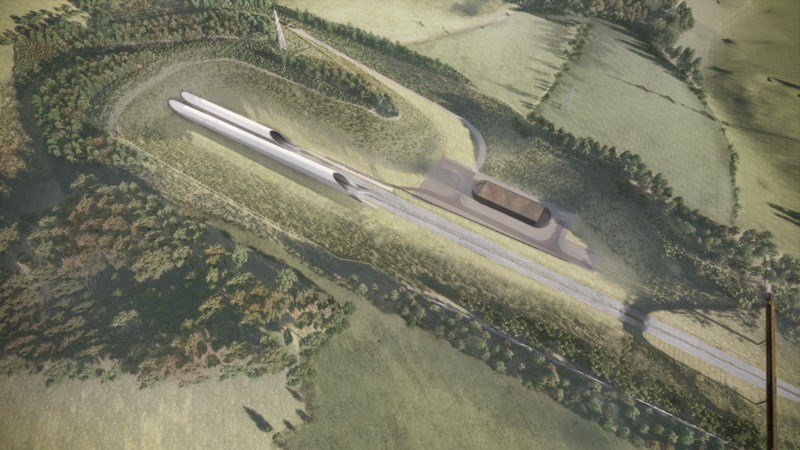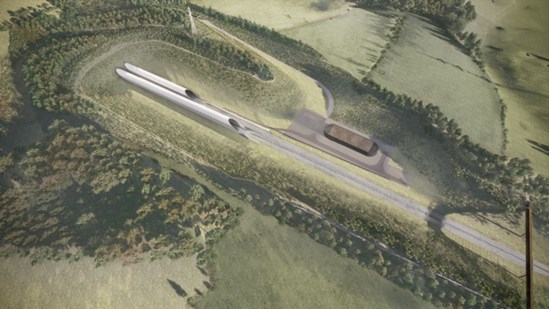Two perforated concrete hoods will cover the track, extending the 10 mile long tunnel into the open air. These ‘porous portals’ will avoid sudden changes in air pressure – and resulting noise – caused by trains entering and exiting the tunnels.
Set low into the landscape between Great Missenden and South Heath in Buckinghamshire, the portals will only be visible from a footbridge over the railway to the north.
To allow for the different levels of air pressure, the portal for trains entering the tunnel will be 220m long, while the one for those exiting will be just 135m. Both will have smooth concrete on top and textured concrete to a low level, to reduce staining and maintenance.
Alongside the portals, there will also be a simple single-storey ancillary building to house mechanical and electrical equipment. HS2 are currently seeking views from the community about the final design, with options including a green roof, split louvred or anodised aluminium façade.
HS2 Ltd’s Project Client, David Emms said:
“Once construction is complete, the Chiltern tunnel will take HS2 trains deep under the Chiltern hills, linking London with Birmingham and the North and releasing space for more freight and local services on the existing mainline.
“Set low into the landscape and out of sight for most passers-by, the structures will play a crucial role in cutting out unnecessary noise and housing essential mechanical and electrical equipment. We are keen to hear local views and I would encourage people living locally to have a look at the designs and let us know what they think.”
The structures have been designed and will be built by HS2 Ltd’s main works contractor Align JV – a team made up of Bouygues Travaux Publics, Sir Robert McAlpine, and VolkerFitzpatrick.
Work is well underway, with two enormous 2,000 tonnes tunnel boring machines heading north from the south portal to excavate the twin-bore tunnels. They reached Chalfont St Peter last week and are expected to breakthrough at the north portal in two years’ time.
Alan Price, Align JV Design Director said:
“Our TBMs, Florence and Cecilia are making good progress and have each completed over 3km on their journey to the north portal.
“We are always very conscious of the sensitive setting for any permanent structures on the project and this includes the north portal design. We welcome comments from local stakeholders in order that we can finalise the design.”
To the north of the tunnel, the new high speed line will be set into a cutting for 1.8 miles (3km) on its approach to the Wendover Dean Viaduct, with more than 20 hectares of new woodland, shrubs and wildflowers planted to help blend the railway into the surrounding countryside. The species chosen will be typical to the Chilterns including Beech, Oak, Yew, Holly and Dog Rose.
Across this stretch of the line, six new bridges will cross the railway cutting, linking country lanes and historic footpaths to the east and west. New planting will also link existing ancient woodlands alongside of the line, boosting biodiversity and connecting and enhancing existing wildlife habitats.
The surface route to the north of the tunnels, is being built by another of HS2’s main works contracts, EKFB - a team made up of Eiffage, Kier, Ferrovial Construction and Bam Nuttall.
More information – and an opportunity for local residents to respond to the designs – can be found here: https://www.hs2.org.uk/chiltern-tunnel-north-portal-ancillary-building-key-design-element/

